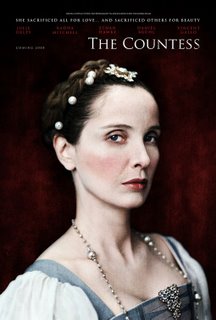
THE COUNTESS
France/Germany, 2009, 94 minutes, Colour.
Julie Delpy, Daniel Bruehl, William Hurt, Stephen Blomberg.
Directed by Julie Delpy.
Count Istvan Thurzo reminds the audience at both beginning and end of this 16th-17th century Hungarian tale that history is written by the victors – and questions whether it is trustworthy. We need only think of the nearby Transylvanian history, legends and myths of Vlad the Impaler and the Dracula stories.
Countess Erzebet Barthory is not so well-known (and in an impassioned speech at the end of the film the Countess reminds us of continued male dominance and influence and the putting down of women, women rulers – although the Countess was a younger contemporary of Elizabeth I).
The tales of Countess Barthory concern the killing of virgins so that she could bathe in their blood and maintain her fresh complexion.
Julie Delpy has wanted to make a film about the Countess for some time. At last, she has done so. The style of the film is traditional enough and it revels in its castles, décor and costumes and music.
Born in 1560, Erzebet had a strict, aristocratic upbringing, cold, merciless and Protestant. Her adolescent misdemeanours (including bearing an illegitimate child) were harshly punished. She bore her husband, in an arranged marriage, three children and managed his estates with successful efficiency while he was away at war with the Turks. On his sudden death, she assumed full control of the estates and might have made a more powerful rule than she was (not afraid to challenge the king to pay his debts to her) had she married the ruthless Count Thurza (William Hurt).
Instead she fell passionately in love with the count's son, Istvan (Daniel Bruehl). His father intervened to prevent the liaison, marrying off his son in Denmark.
Living in isolation in her castle, her closest friend and adviser a woman considered a lesbian witch (Anamaria Marinca), she became obsessed with her looks as she moved into her 40s. An impetuously angry attack on a young servant spattered her with blood and the process of seeking and killing virgins began.
After the historical narrative of her upbringing and the death of her husband, the film settles down and becomes a focused drama about the deteriorating mind and character of the Countess.
Julie Delpy wrote, directed, composed the score and is a powerful presence as the Countess. Some gory touches but much less than a continued spattering of the screen. More is left to the imagination.
1.The legends about the Countess Barthory? Fact, fiction?
2.Istvan and his comments about history being written by those who conquered, whose perspective here on Countess Barthory? Enemies, men, the powerful?
3.Julie Delpi’s project, her variety of roles and performance?
4.The 16th and 17th centuries, Central Europe, Hungary and its castles, Vienna and the city, the churches, Protestant and Catholic? The wars against Turkey? Power, the role of the church?
5.The explanation of the countess in her historical context: her difficult birth, her mother’s hostility and coldness, growing up hard, burying the canary alive to understand about breath, her fights, the warriors, the sexual encounter as a teenager, the reprimands, the birth of her child and its being removed? Her grief and her hardness?
6.The arranged marriage, her husband being away at the wars, bearing three children? Her skills in management, yet her reliance on Darvulia? The household suspicion of the sexual relationship with the witch?
7.The count’s return, his illness and death? The consequences? The countess going to the king, demanding payment for her debts? His reaction? The banquet, the meeting with the Count Thirza? His proposal, her wanting her independence?
8.Istvan, seeing her at the dance, the meeting, her calculated approach, the dance, the seduction, the night, the effect on him? The effect on her? The differences in age, falling in love? The exchange of letters, her hopes, waiting, her plan?
9.Istvan’s father, his scheme, ruthlessness? The marriage for his son?
10.The rendezvous, her waiting, his being imprisoned? Her not knowing the truth?
11.The countess and her children, moving them from the estate, going to visit them? Her return? Relying on the witch and her advice?
12.Her decline, clothes, pining away, her abrupt angers? Her being concerned about age, her appearance? The blood incident with the servant? The sadism with the man from Vienna? His being part of Istvan’s father’s plot? The contrast whether he should die or the witch should die? The death of the witch – and her final words to the countess?
13.The idea of the blood, her extreme vanity, the girl and draining her blood, the others, the maids and the man helping, the murders, the construction of the machine? The priest, the burials, the money? His death?
14.The king, the discussions about the countess and her behaviour? Istvan, his father? Sending Istvan to arrest her? Her seeing him riding in the distance, his arrival?
15.The countess and the effect? Istvan and the effect? Their love?
16.The meeting, the trial, her arrest, the search, finding the proof, the machine? Her being walled up?
17.The countess and God, her prayer, sense of sin, not wanting to go to Hell, slitting her veins and dying?
18.Her final speech, the feminist content and approach?
19.The overall effect of this portrait of a 17th century woman?